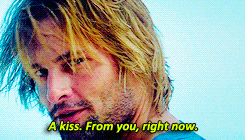You’ve met him before. He’s your favorite surgeon in every medical drama and your favorite twenty-something in every sitcom. He’s the bad boy, the clown, and the hot one all wrapped up in one. Sassy, acerbic, sarcastic, and funny, he doles out the nicknames, the caustic one-liners, and the last laughs. Above all else, he’s a ruthless womanizer who won’t take no for an answer. I like to call this character the Lovable Misogynist™. Wondering if he sounds familiar? Here are four tell-tale signs that you’re favorite character is another incarnation of this prolific trope. To discuss his most important traits, I’ll be using two of the most recognizable Lovable Misogynists [LMs] in recent history: Barney Stinson from How I Met Your Mother (2005-2014) and Sawyer from Lost (2004-2010).
He objectifies and sexualizes every woman he comes in contact with.
This character is often used for comic relief. In practice, that often means he can’t resist dropping a sexual innuendo into every conversation with a woman. These remarks come off as non-sequiturs given the random and uncalled-for nature of the LM’s comments. This spontaneity supposedly lightens the tone of conversation, while amounting to little more than rampant sexual harassment. This is one of the most obvious symptoms displayed by a Lovable Misogynist. One could easily think back to Sawyer on ABC’s Lost, as he constantly ‘teases’ Kate. His brand of flirting ranges from cheesy one-liners like “How about you come a little closer and warm me up?” to the suggestive look he gives her after one of their overseers suggests Kate strip in the work field when the two are enslaved by the Others. Barney Stinson’s raging misogyny is less subtle. Suffice it to say that this is his stance on women: “Bimbos. They’re easily confused. It’s one of the thousand little things I love about them. I love their vacant, trusting stares; their sluggish, unencumbered minds; their unresolved daddy issues…”
He pursues women after they say “no.”
Barney Stinson’s entire character revolves around tricking women into sex. In earlier seasons, his strategies are tamer, as when he explains, “every Halloween, I bring a spare costume, in case I strike out with the hottest girl at the party. That way, I have a second chance to make a first impression.” In later seasons, he unveils his “Playbook:” an entire guide dedicated to the idea that when a woman says “No,” she actually means “Convince me.” Sawyer actually does force Kate into a sexual act early in the first season after she had already reacted unimpressed to his previous attempts to flirt. When Kate confronts him as to the location of the inhaler belonging to a girl dying of an asthmatic attack, he refuses to give away the location until she kisses him. Kate is shocked that even Sawyer would demand this, claiming “Nobody’s that disgusting.” But she ultimately gives him what he wants. Only after the kiss does Sawyer reveal that he doesn’t know where the inhaler is. Sexual harassment. Sexual assault. These are not above the character of the Lovable Misogynist. They’re just a part of his charm.

Sawyer being his charming self (Courtesy of jamesfords.tumblr.com)
Fellow characters treat his behavior as a funny quirk.
A common defense of the LM character is that their behavior is often condemned by his friends. It’s true that in reaction to nearly every LM character, fellow characters reply with exasperation at his antics. But do they say or do anything in regards to his behavior? No. Even the women at the receiving end of his harassment often just roll their eyes, shrug their shoulders, and get back to their day. This character is the joker of the group. The funny guy. He is ultimately trusted by the members of his group. Despite Ted’s much better treatment of women, he has no problem with Barney being his wingman. And Sawyer works alongside Jack and Kate as one of the leaders of the island’s community, his treatment of Kate notwithstanding.
His long-rejected advances towards the Strong Female Character eventually wear her down.
The final, and perhaps most troubling, aspect of the Lovable Misogynist trope: He always ‘gets’ the Girl. The Girl invariably being the one woman immune to his charms that he’s been chasing from the beginning. Always independent, often career-minded, this woman eventually caves after months or years of supposedly playing hard-to-get, swooning into the arms of her abuser. It’s every friend-zoned dude-bro’s wet dream, played out again and again on the small screen. Although Kate often defends herself against Sawyer, once asking him “You try to be a pig or it just come naturally?” and once calling him out on stalking her when she’s tracking in the woods, she admits to her long pent-up romantic feelings in season 3 and sleeps with him. Robin in How I Met Your Mother follows an eerily similar story line. In early seasons she grudgingly bears Barney’s perusal of other women. However, season 8 culminates with Robin accepting Barney’s sudden marriage proposal after months of his persistence that he didn’t care about her at all. Lady T at Bitch Flicks calls Barney’s treatment of Robin “one of the most glaring examples of emotional abuse disguised as romance in recent memory.”

Literally Barney’s catch-phrase when it comes to women (Courtesy of theawesomedaily.com)
Barney Stinson in How I Met Your Mother.
Sawyer in Lost.
Richard Fish in Ally McBeal.
Howard Wolowitz in The Big Bang Theory.
Tom Haverford in Parks and Recreation.
Schmidt in New Girl.
Gregory House in House, M.D.
Captain Hook in Once Upon a Time.
Dean Winchester in Supernatural…
And this is by no means an exhaustive list. I can only speak to the TV shows I’ve seen. But there is an emerging pattern here that’s spread through old and new media like a festering plague. The familiarity of this behavior on-screen can make it seem non-threatening. It’s easy to waive the actions of these men off as jokes, offensive though they may be. But these characters aren’t even the bad guys on their shows. They may act disrespectfully, cruelly, non-consensually—altogether, villainously, but these characters are not villains. They are the protagonists. The ones you root for. They may be anti-heroes, but they are heroes nonetheless. And like any true Hollywood hero, they are rewarded a woman as a prize near the conclusion of their narrative. We are meant to sympathize with these characters, which ultimately affirms their behavior as harmless instead of horrific.
Men who act like the Lovable Misogynist in real life are the bad guys. The antagonist. They’re the rapists, the abusers, the ones all of us women are told to keep away from before we even start to think about liking boys. However fictional his narrative may be, if there is one trait that can sum up the LM, it is his overwhelming sense of entitlement to women. And this sense of entitlement is far from fictional. It’s the very same mindset behind the recent deaths of Mary Spears, Maren Sanchez, and the six victims of the Isla Vista shooting. All were murdered by men resenting their rejection by a woman. (Although in killer Elliot Roger’s case, he defined “rejection” as women not throwing themselves at him since puberty.) By now, everyone has heard of the extensive government survey from 2011 that revealed one in five American women has experienced sexual assault. Why are we even shocked by these statistics? We’ve been laughing at the way men treat women as if we’ve been watching harmless children play. If we expect men to play with women like children play with toys, why are we surprised when they break them?
When the behavior displayed by these men is trivialized as humor, we affirm the behavior of real-life bad guys. We normalize the everyday misogyny experienced by real women. And worst of all, when we laugh at the antics of the Lovable Misogynist, we laugh in the face of his victims.
*Note: The term “Lovable Misogynist” is not actually trademarked.
